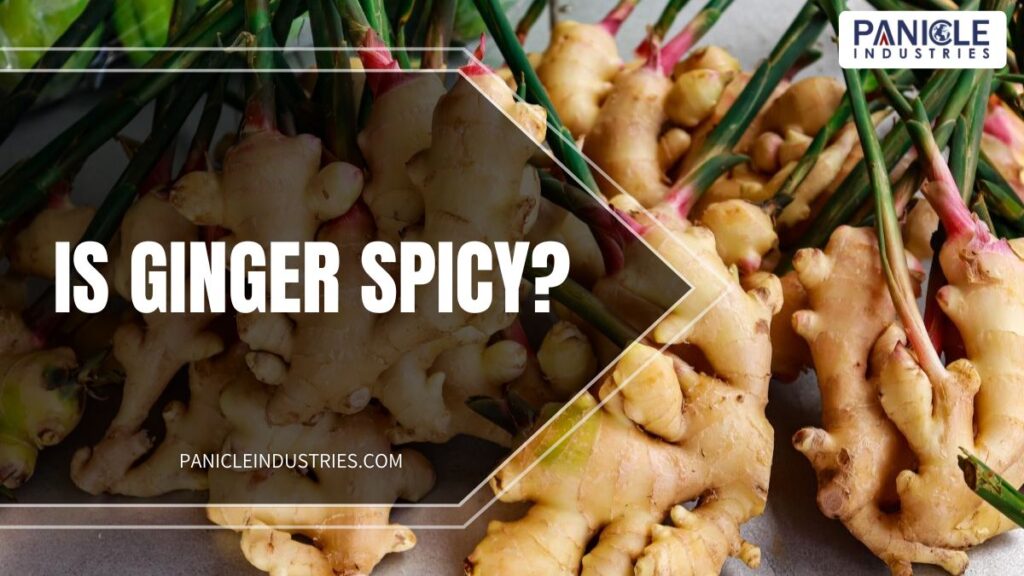Many people who use ginger in their food or drink may wonder, is ginger spicy? The answer depends on how you define “spicy.” Ginger is known for its sharp, warm, and sometimes peppery taste, which can create a tingling or burning sensation on the tongue. It does not have the same heat as chili peppers, but it does add a strong kick to dishes. This makes some people think of it as spicy, while others see it as aromatic or pungent.
In this blog, we will explore what makes ginger taste the way it does, whether it is truly spicy, and how this unique root is used in both cooking and traditional medicine. Let’s discover the real flavor of ginger.
What Is Ginger?
Ginger is a rhizome, which means it is a type of underground stem. It comes from the plant Zingiber officinale, which is native to Southeast Asia. Ginger has been used for thousands of years in cooking and medicine. It is available in many forms including:
- Fresh ginger root
- Dried ginger powder
- Ginger paste
- Ginger tea
- Candied or crystallized ginger
Each form of ginger has its own level of strength, heat, and aroma. It is widely used across Indian, Chinese, Thai, and Western cuisines.
Also read: Spices for Ribs
Is Ginger Spicy?
Let’s address the main question: Is ginger spicy?
The answer is yes and no. Ginger is not spicy in the same way as chili peppers, which contain capsaicin, a compound that causes a burning heat. However, ginger contains gingerol, a compound that gives it a warm, sharp, and slightly peppery taste.
When you eat ginger, especially raw or in large amounts, it can make your tongue feel hot or tingly. This is why many people call it spicy, even though it doesn’t cause the same kind of intense heat as hot peppers.
Why Does Ginger Taste Spicy?
The spicy taste of ginger comes from natural chemicals found in the root:
1. Gingerol
- Found in fresh ginger
- Causes a warm, sharp, and pungent flavor
- Has anti-inflammatory and antioxidant properties
2. Shogaol
- Formed when ginger is dried or cooked
- Stronger and spicier than gingerol
- Gives dried ginger powder a more intense heat
3. Zingerone
- Created when ginger is cooked
- Less spicy and more sweet
- Adds flavor without too much heat
These compounds give ginger its unique spicy-sweet flavor and make it suitable for both sweet and savory dishes.
How Spicy Is Ginger Compared to Other Spices?
To understand how spicy ginger is, let’s compare it to other common spices:
| Spice | Spiciness Level | Heat Compound |
|---|---|---|
| Ginger | Mild to medium | Gingerol, Shogaol |
| Black Pepper | Medium | Piperine |
| Chili Peppers | Hot to very hot | Capsaicin |
| Mustard | Medium to hot | Allyl isothiocyanate |
| Cinnamon | Mild and warm | Cinnamaldehyde |
Ginger has a milder heat compared to chili peppers but a more noticeable zing than cinnamon. Its heat is short-lived and usually followed by a slight sweetness.
Cooking with Ginger
Ginger is extremely versatile and used in many ways depending on the dish. Here’s how its spicy taste plays a role in cooking:
1. In Savory Dishes
- Used in curries, stir-fries, soups, and sauces
- Adds warmth and depth to the dish
- Blends well with garlic, onions, and green chilies
2. In Sweet Dishes
- Used in cookies, cakes, and gingerbread
- Adds a warm spice that balances sweetness
- Often paired with cinnamon and nutmeg
3. In Beverages
- Ginger tea is popular for its warming and soothing qualities
- Used in lemon and honey drinks for cold relief
- Adds flavor and heat to smoothies and juices
4. In Pickles and Marinades
- Gives a sharp, tangy flavor
- Helps preserve other ingredients
- Enhances the taste of meat and vegetables
Health Benefits of Ginger
Apart from its flavor, ginger is also known for many health benefits:
1. Helps with Digestion
Ginger boosts saliva and bile production, which improves digestion and helps reduce bloating.
2. Reduces Nausea
Used to treat motion sickness and morning sickness. A small piece of ginger can calm the stomach.
3. Fights Cold and Flu
Its warming effect helps fight cold symptoms, reduces congestion, and soothes sore throats.
4. Anti-Inflammatory
Gingerol helps reduce inflammation in joints and muscles, useful for arthritis sufferers.
5. Controls Blood Sugar
Some studies show ginger may help reduce blood sugar levels when used regularly.
Forms of Ginger and Their Spice Level
| Form of Ginger | Spice Level | Common Uses |
|---|---|---|
| Fresh Ginger Root | Mild–Medium | Curries, teas, stir-fries |
| Dried Ginger Powder | Medium–Hot | Baking, spice blends, herbal remedies |
| Pickled Ginger | Mild | Sushi, salads |
| Ginger Tea | Mild | Health drinks, cold remedies |
| Crystallized Ginger | Sweet–Mild | Desserts, snacks |
Each form of ginger varies in spiciness and taste. For a stronger kick, dried ginger is usually hotter than fresh.
Can You Reduce Ginger’s Spiciness?
Yes, if you find ginger too spicy, you can tone it down:
- Cook it longer: This softens its sharpness and makes it more sweet than spicy.
- Add sweetness: Pair with honey or sugar in teas and desserts.
- Mix with dairy: Add yogurt or coconut milk to mellow the heat in curries.
- Use in small amounts: A little goes a long way, especially with dried powder.
These tricks help you enjoy the benefits of ginger without the extra heat.
Is Ginger Safe for Everyone?
Ginger is safe for most people, but here are a few things to keep in mind:
- In large amounts, it may cause heartburn or upset stomach.
- People on blood-thinning medications should use it with care.
- Always consult a doctor before taking large doses, especially as a supplement.
In general, moderate use of ginger in cooking is safe and beneficial.
Interesting Facts About Ginger
- Ginger has been used in Ayurvedic and Chinese medicine for over 3,000 years.
- It was once a rare spice in Europe and very expensive during the Middle Ages.
- Ginger is not only used for food but also in perfumes, candles, and beauty products due to its fresh scent.
Conclusion
So, is ginger spicy? Yes, but in a gentle and pleasant way. Unlike hot chili peppers, ginger’s heat comes from natural compounds like gingerol, which offer both flavor and health benefits. Its unique warmth and zest make it a favorite in kitchens around the world. From teas and soups to desserts and stir-fries, ginger adds depth, aroma, and a slight kick that enhances every dish. Whether you’re using it for its taste or health benefits, ginger is truly a spice worth keeping in your pantry. Its mild spice is suitable for most people, and with the right balance, it can make your meals more flavorful and nourishing every day.


